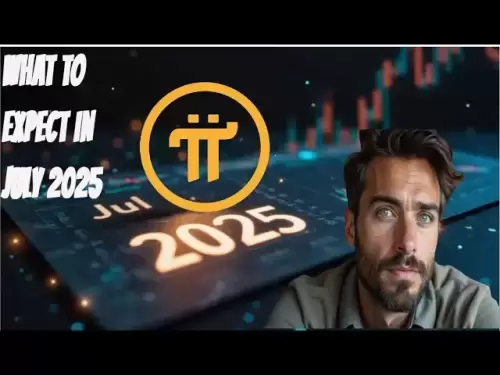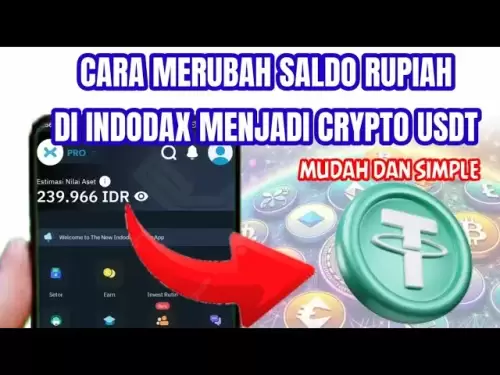-
 Bitcoin
Bitcoin $107,443.3008
-1.17% -
 Ethereum
Ethereum $2,494.2503
-0.63% -
 Tether USDt
Tether USDt $1.0003
0.00% -
 XRP
XRP $2.2496
2.23% -
 BNB
BNB $658.7569
0.63% -
 Solana
Solana $154.9826
1.94% -
 USDC
USDC $1.0000
0.01% -
 TRON
TRON $0.2799
1.07% -
 Dogecoin
Dogecoin $0.1659
-1.78% -
 Cardano
Cardano $0.5745
0.25% -
 Hyperliquid
Hyperliquid $39.7005
0.13% -
 Bitcoin Cash
Bitcoin Cash $519.5989
3.78% -
 Sui
Sui $2.7874
-2.40% -
 Chainlink
Chainlink $13.3762
-1.69% -
 UNUS SED LEO
UNUS SED LEO $9.0784
-0.64% -
 Avalanche
Avalanche $17.9846
-2.81% -
 Stellar
Stellar $0.2390
-0.06% -
 Toncoin
Toncoin $2.9028
0.25% -
 Shiba Inu
Shiba Inu $0.0...01147
-2.17% -
 Litecoin
Litecoin $86.6956
-1.27% -
 Hedera
Hedera $0.1508
-0.50% -
 Monero
Monero $322.6222
3.26% -
 Polkadot
Polkadot $3.4124
-2.99% -
 Dai
Dai $0.9999
0.00% -
 Bitget Token
Bitget Token $4.5434
-1.97% -
 Ethena USDe
Ethena USDe $1.0002
0.00% -
 Uniswap
Uniswap $7.1562
-2.61% -
 Aave
Aave $275.8830
-1.02% -
 Pepe
Pepe $0.0...09790
-4.04% -
 Pi
Pi $0.5018
-5.09%
How to receive digital currencies in Trust Wallet?
Trust Wallet supports receiving various cryptocurrencies; ensure you use the correct address to avoid irreversible loss of funds. Always prioritize security.
Apr 05, 2025 at 09:49 am
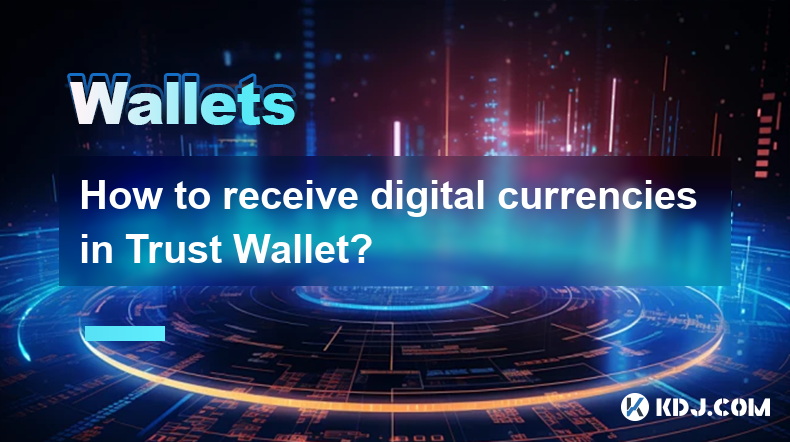
Understanding Trust Wallet and Receiving Crypto
Trust Wallet is a popular mobile cryptocurrency wallet known for its user-friendly interface and support for a wide range of cryptocurrencies and tokens. Receiving digital currencies into your Trust Wallet involves several simple steps, but understanding the nuances is crucial to avoid errors and potential security risks. This guide will walk you through the process, explaining different scenarios and addressing common concerns.
Receiving Bitcoin (BTC) and Other Cryptocurrencies
The core process for receiving most cryptocurrencies in Trust Wallet is similar. The key is obtaining the correct receiving address.
- Open Trust Wallet: Launch the Trust Wallet application on your mobile device.
- Select the Cryptocurrency: Navigate to the portfolio section and choose the specific cryptocurrency you wish to receive (e.g., Bitcoin, Ethereum, Binance Coin).
- Access the Receive Screen: You'll find a "Receive" button or a similar option. Tap it.
- View Your Receiving Address: Your unique receiving address (a long string of alphanumeric characters) will be displayed, along with a QR code. This is your wallet's identifier.
- Share Your Address: Share this address (or QR code) with the sender. Ensure you share the correct address for the intended cryptocurrency. Sending Bitcoin to an Ethereum address will result in irreversible loss of funds.
- Confirm the Transaction: Once the sender initiates the transaction, you'll see a pending transaction in your Trust Wallet. The confirmation time varies depending on the cryptocurrency and network congestion.
Receiving ERC-20 and BEP-20 Tokens
ERC-20 and BEP-20 tokens are built on the Ethereum and Binance Smart Chain blockchains, respectively. Receiving these tokens requires slightly different approaches.
- For ERC-20 Tokens: You typically need to have Ethereum in your Trust Wallet beforehand. The receiving address for the ERC-20 token will be displayed within the Trust Wallet app after selecting the specific token. The Ethereum network handles the transaction.
- For BEP-20 Tokens: Similarly, you might need BNB (Binance Coin) in your wallet. The receiving address is specific to the BEP-20 token and will be displayed in the app. The Binance Smart Chain network processes the transaction. Double-check the network (ERC-20 or BEP-20) before sending tokens to avoid losses.
Security Best Practices for Receiving Crypto
Security should always be your top priority. Here are some essential practices:
- Verify the Sender: Always confirm the sender's identity and legitimacy before accepting funds. Scams are prevalent in the cryptocurrency space.
- Check the Amount: Ensure the amount received matches the expected amount. Discrepancies could indicate a problem.
- Avoid Public Wi-Fi: Use a secure and trusted internet connection when receiving cryptocurrencies to prevent potential attacks.
- Keep Your Wallet Secure: Use a strong password and enable two-factor authentication (2FA) for enhanced security.
- Regularly Update Your Wallet: Keep your Trust Wallet app updated to benefit from the latest security patches and features.
Understanding Transaction Fees (Gas Fees)
Many cryptocurrency transactions incur fees, often called "gas fees" on networks like Ethereum. These fees are paid to miners or validators for processing the transaction.
- Gas Fees Vary: The amount of the gas fee depends on the network's congestion and the complexity of the transaction.
- Sender Pays Fees: Typically, the sender pays the transaction fees, not the receiver. However, be aware that exceptionally high gas fees might be a red flag.
- Network Congestion: During periods of high network activity, gas fees can be significantly higher. Consider sending during off-peak hours if possible.
Dealing with Failed or Pending Transactions
Occasionally, transactions can fail or remain pending for extended periods.
- Check Network Status: Verify the status of the relevant blockchain network. High congestion can cause delays.
- Contact Support: If the issue persists, contact Trust Wallet support or the cryptocurrency exchange where the transaction originated.
- Transaction Hash: If a transaction fails, you'll likely receive a transaction hash. This ID can be used to track the transaction status on a blockchain explorer.
Receiving NFTs in Trust Wallet
Non-Fungible Tokens (NFTs) are also supported by Trust Wallet. Receiving NFTs involves similar steps, but the receiving address will be specific to the NFT's blockchain (e.g., Ethereum).
- NFT Marketplaces: You will typically receive NFTs from NFT marketplaces after a successful purchase.
- Direct Transfers: You can also receive NFTs through direct transfers from other wallets, provided they are compatible with your Trust Wallet.
- NFT Collection: Once received, your NFTs will be added to your NFT collection within Trust Wallet.
Frequently Asked Questions
Q: What if I enter the wrong receiving address?
A: Sending cryptocurrency to the wrong address usually results in irreversible loss of funds. Double-check the address before sending.
Q: How long does it take to receive cryptocurrency?
A: The time varies depending on the cryptocurrency and network congestion. It can range from a few seconds to several minutes or even hours.
Q: What if I don't see the received cryptocurrency in my wallet?
A: Check the transaction status on a blockchain explorer using the transaction hash. Contact Trust Wallet support if needed.
Q: Is Trust Wallet safe?
A: Trust Wallet employs various security measures, but like any digital wallet, it's essential to follow best practices to protect your funds.
Q: Can I receive all cryptocurrencies in Trust Wallet?
A: Trust Wallet supports a wide range of cryptocurrencies and tokens, but not all. Check their supported coins list before attempting to receive a particular cryptocurrency.
Q: What should I do if I suspect a scam?
A: Do not share your private keys or seed phrase with anyone. Report suspicious activity to the appropriate authorities and Trust Wallet support. Never send funds to untrusted sources.
Disclaimer:info@kdj.com
The information provided is not trading advice. kdj.com does not assume any responsibility for any investments made based on the information provided in this article. Cryptocurrencies are highly volatile and it is highly recommended that you invest with caution after thorough research!
If you believe that the content used on this website infringes your copyright, please contact us immediately (info@kdj.com) and we will delete it promptly.
- Solana, Pepe Coin, Crypto Meme Mania: What's Hot and What's Not?
- 2025-07-01 19:10:12
- Bitcoin Cash Price Pump: Unpacking the Reasons Behind the Surge
- 2025-07-01 18:30:12
- Dogecoin's Wild Ride: Rally Potential Amidst Investor Panic?
- 2025-07-01 19:10:12
- Algorand, Wormhole, and Interoperability: A New Dawn for DeFi
- 2025-07-01 19:15:12
- CATL's Indonesian Battery Blitz: A 6 Billion Dollar Bet on the Future
- 2025-07-01 19:20:14
- Bitcoin, PEP-20, and the Token Standard Revolution: Is Bitcoin Pepe the Next Big Thing?
- 2025-07-01 18:30:12
Related knowledge
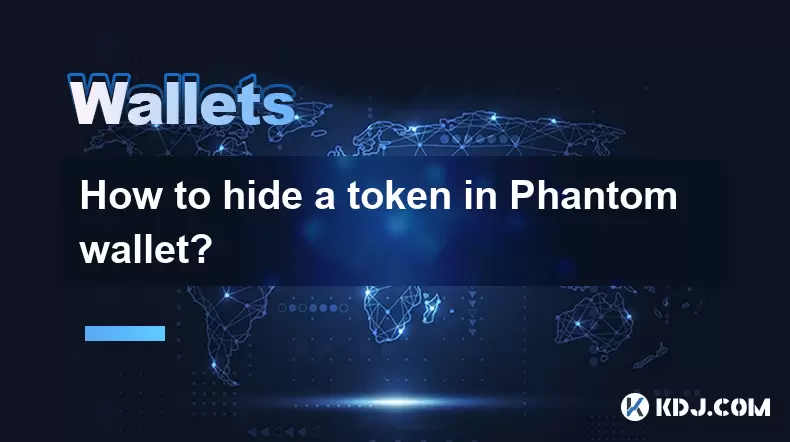
How to hide a token in Phantom wallet?
Jul 01,2025 at 05:49pm
Understanding the Phantom Wallet InterfacePhantom wallet is a popular non-custodial wallet used primarily for interacting with the Solana blockchain. It allows users to store, send, receive, and manage various tokens, including both fungible and non-fungible tokens (NFTs). Before attempting to hide a token, it's essential to understand how the wallet in...
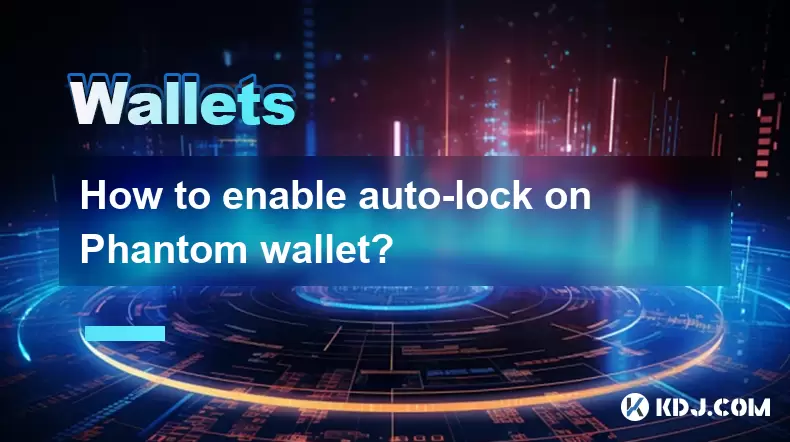
How to enable auto-lock on Phantom wallet?
Jul 01,2025 at 04:01pm
What is Auto-Lock in Phantom Wallet?Phantom wallet is a popular non-custodial cryptocurrency wallet used primarily for interacting with the Solana blockchain. One of its security features includes the ability to set an auto-lock timer, which ensures that the wallet locks itself automatically after a period of inactivity. Auto-lock enhances security by p...
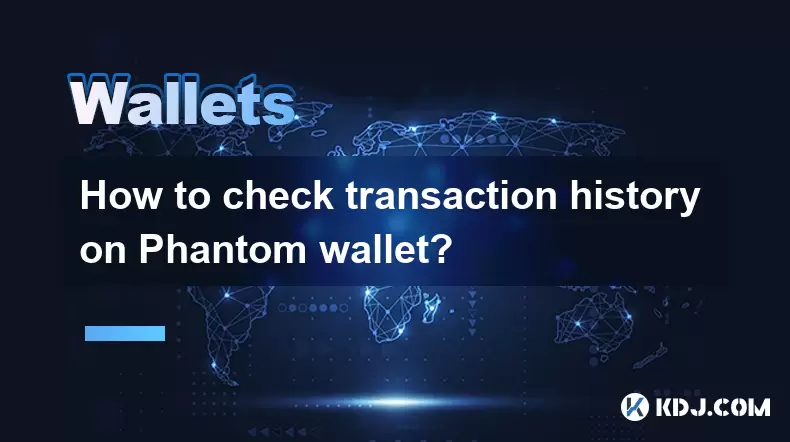
How to check transaction history on Phantom wallet?
Jul 01,2025 at 07:49pm
What Is Phantom Wallet?Phantom wallet is a popular non-custodial cryptocurrency wallet primarily used for interacting with the Solana blockchain. It allows users to store, send, receive, and manage their Solana-based tokens and NFTs securely. One of the essential features of any crypto wallet is the ability to check transaction history. Understanding ho...
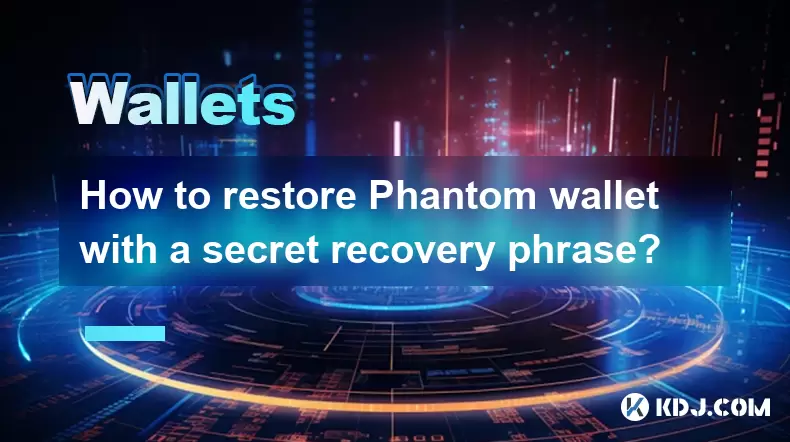
How to restore Phantom wallet with a secret recovery phrase?
Jul 01,2025 at 02:56pm
What is a Phantom wallet and why might you need to restore it?Phantom is a popular non-custodial cryptocurrency wallet primarily used for interacting with the Solana blockchain. It allows users to store, send, receive, and stake SOL tokens as well as manage NFTs and other SPL tokens. Since Phantom wallet is non-custodial, users are solely responsible fo...
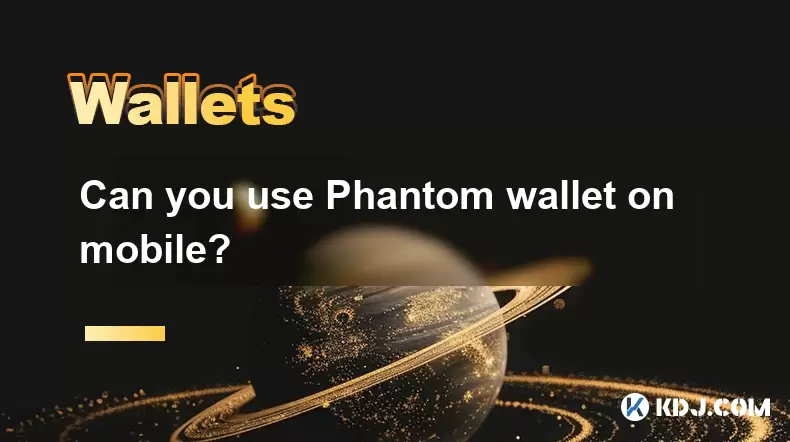
Can you use Phantom wallet on mobile?
Jul 01,2025 at 06:07pm
Understanding Phantom Wallet and Its Mobile CompatibilityPhantom wallet is a non-custodial cryptocurrency wallet primarily designed for interacting with the Solana blockchain. Initially developed as a browser extension, Phantom has expanded its functionality to include mobile platforms. This means users can access their Solana-based assets on mobile dev...
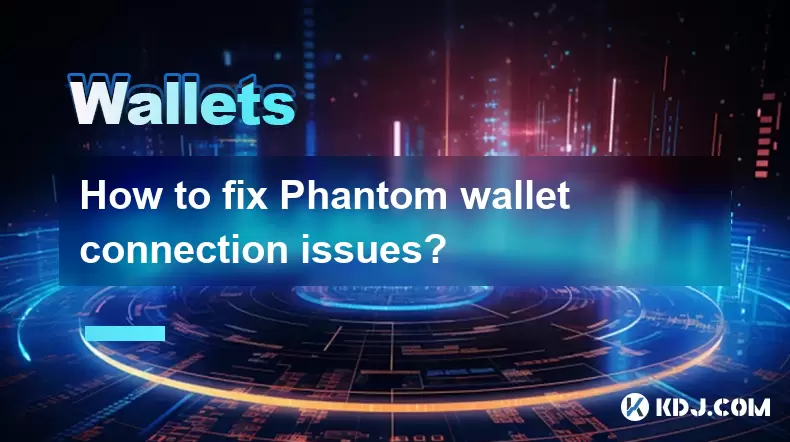
How to fix Phantom wallet connection issues?
Jul 01,2025 at 02:21pm
Understanding Phantom Wallet Connection IssuesPhantom wallet is one of the most popular non-custodial wallets for interacting with Solana-based decentralized applications (dApps). However, users occasionally face connection problems when trying to link their wallet to a dApp or platform. These issues can manifest as error messages, failed connection att...

How to hide a token in Phantom wallet?
Jul 01,2025 at 05:49pm
Understanding the Phantom Wallet InterfacePhantom wallet is a popular non-custodial wallet used primarily for interacting with the Solana blockchain. It allows users to store, send, receive, and manage various tokens, including both fungible and non-fungible tokens (NFTs). Before attempting to hide a token, it's essential to understand how the wallet in...

How to enable auto-lock on Phantom wallet?
Jul 01,2025 at 04:01pm
What is Auto-Lock in Phantom Wallet?Phantom wallet is a popular non-custodial cryptocurrency wallet used primarily for interacting with the Solana blockchain. One of its security features includes the ability to set an auto-lock timer, which ensures that the wallet locks itself automatically after a period of inactivity. Auto-lock enhances security by p...

How to check transaction history on Phantom wallet?
Jul 01,2025 at 07:49pm
What Is Phantom Wallet?Phantom wallet is a popular non-custodial cryptocurrency wallet primarily used for interacting with the Solana blockchain. It allows users to store, send, receive, and manage their Solana-based tokens and NFTs securely. One of the essential features of any crypto wallet is the ability to check transaction history. Understanding ho...

How to restore Phantom wallet with a secret recovery phrase?
Jul 01,2025 at 02:56pm
What is a Phantom wallet and why might you need to restore it?Phantom is a popular non-custodial cryptocurrency wallet primarily used for interacting with the Solana blockchain. It allows users to store, send, receive, and stake SOL tokens as well as manage NFTs and other SPL tokens. Since Phantom wallet is non-custodial, users are solely responsible fo...

Can you use Phantom wallet on mobile?
Jul 01,2025 at 06:07pm
Understanding Phantom Wallet and Its Mobile CompatibilityPhantom wallet is a non-custodial cryptocurrency wallet primarily designed for interacting with the Solana blockchain. Initially developed as a browser extension, Phantom has expanded its functionality to include mobile platforms. This means users can access their Solana-based assets on mobile dev...

How to fix Phantom wallet connection issues?
Jul 01,2025 at 02:21pm
Understanding Phantom Wallet Connection IssuesPhantom wallet is one of the most popular non-custodial wallets for interacting with Solana-based decentralized applications (dApps). However, users occasionally face connection problems when trying to link their wallet to a dApp or platform. These issues can manifest as error messages, failed connection att...
See all articles





















